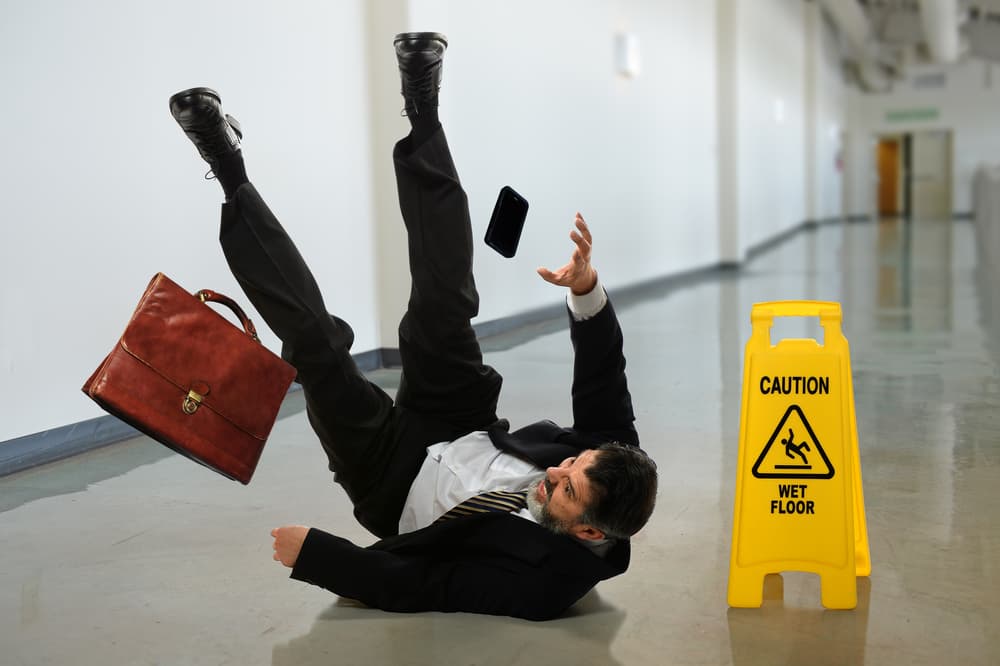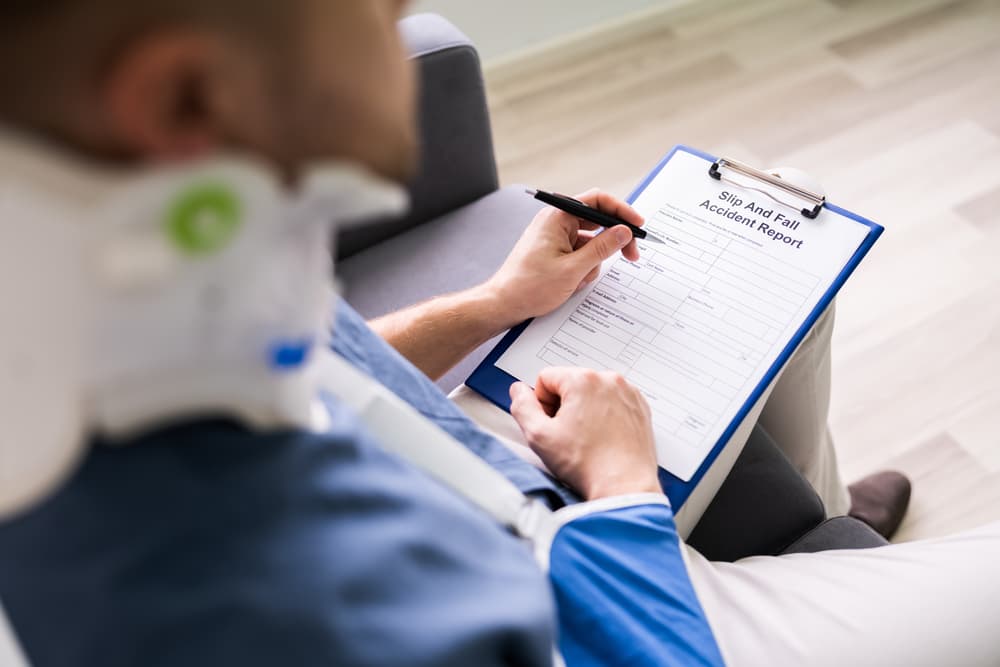Slip and fall accidents can happen anywhere and typically occur when property owners fail to maintain their premises properly. Accident victims also stand to suffer extremely serious injuries in slip and fall accidents since they have very limited protection.
If you or someone you love suffered injuries in a recent slip and fall on someone else’s property, consult an experienced Edmonton premises liability lawyer as quickly as possible. Your lawyer can investigate the scene of your slip and fall accident and determine your eligibility for filing a personal injury claim. Your lawyer can then submit the necessary claim documents to the property owner’s insurance company and negotiate for fair settlement compensation on your behalf.
If the insurance company disputes fault for your slip and fall accident or otherwise refuses to compensate you fairly, your lawyer can pursue litigation in the court system and bring your case to an efficient resolution.
GET YOUR FREE CONSULTATION NOW!
Where do Slip and Fall Accidents Usually Happen?

Slip and fall accidents can occur in various locations, often associated with uneven surfaces, wet or slippery conditions, inadequate lighting, or poor maintenance.
One common site for slip and fall accidents is grocery stores. Spills from products, leaks from refrigerated sections, or wet floors from routine cleaning can create hazardous conditions for shoppers. Inadequate signage or failing to address spills promptly can lead to unsuspecting customers slipping and falling on the ground and suffering debilitating injuries.
Another common location for slip and falls is restaurants and eateries. Food and beverage spills and wet surfaces from cleaning may contribute to slip and fall incidents. Kitchens, where floors may be greasy or wet, pose risks for staff and restaurant patrons.
Retail stores, including shopping malls and individual shops, are also frequent settings for slip and fall accidents. Wet entryways during rainy weather, polished or waxed floors, and uneven surfaces can all contribute to accidents. Retail establishments must prioritize proper maintenance and signage to minimize the risk of falls.
Parking lots and parking garages also present their own set of challenges. Oil spills, uneven surfaces, and weather-related hazards like snow or ice accumulation can make walking treacherous. Poor lighting in these areas can exacerbate the risks of slip and fall accidents – especially at night.
Sidewalks and public walkways, while designed for pedestrian use, can also become hazardous due to cracked pavement, spalling, uneven surfaces, or the accumulation of ice and snow. Property owners, including municipalities, are responsible for maintaining safe conditions to prevent slip and fall accidents in these public spaces.
Finally, slip and fall accidents may also occur at hotels and resorts. Pool areas, lobbies with polished floors, and wet conditions near spa facilities may contribute to accidents if the facility lacks the proper protocols.
If you suffered injuries in a slip and fall accident in one of these locations, a skilled premises liability lawyer can help. Your lawyer can retain a certified accident reconstructionist or other expert to visit the site and determine how the accident occurred – and who was responsible.
Injuries in a Slip and Fall Accident
Slip and fall accidents can result in various injuries, with the severity often depending upon factors like the individual’s age, general health, and the conditions of the fall. Among the most common injuries are fractures, particularly in the wrists, arms, and hips. When individuals instinctively reach out to try and break their fall, the impact can lead to fractures in these vulnerable areas – especially among older adults.
Soft tissue injuries are prevalent in slip and fall incidents, encompassing sprains, strains, and muscular contusions. Twisting or awkward landings can cause damage to ligaments and muscles, resulting in pain, swelling, and limited mobility. These injuries may also be painful and require physical therapy or other forms of rehabilitation.
Head injuries are a significant concern in slip and fall accidents, especially if the individual strikes their head on a hard surface during the fall. Traumatic brain injuries (TBIs), ranging from mild concussions to severe and life-altering conditions, can occur. Head injuries often necessitate immediate medical attention and ongoing monitoring for potential complications.
Back injuries are also common due to the impact of the fall on the accident victim’s spine. Herniated discs, vertebrae fractures, or other spinal injuries can result in chronic pain and long-term mobility issues. The severity of back injuries may vary, with some requiring extensive medical intervention and rehabilitation.
In addition, individuals involved in slip and fall accidents may experience dislocated joints, such as shoulders or elbows, if they land on an outstretched arm. These injuries can be painful and may require medical intervention to address joint dislocation and potential complications.
Finally, cuts and abrasions are also common in slip and fall incidents, particularly when the individual lands on a hard or sharp surface. While cuts may seem minor, they can lead to infections if the accident victim does not seek prompt medical treatment after their fall.
Given the potential severity of these injuries, individuals involved in slip and fall accidents should seek prompt and ongoing medical attention to address and mitigate the effects of their injuries. Additionally, documenting the conditions that led to their fall and seeking prompt legal advice are important.
Following a slip and fall accident, a knowledgeable premises liability lawyer can communicate with insurance company representatives on your behalf and pursue the monetary recovery you deserve by filing a timely claim or lawsuit in your case.
What is a Property Owner’s Legal Duty of Care to a Property Visitor?
A property owner owes a legal duty of care to visitors on their premises, and this duty is rooted in the concept of premises liability. The level of duty owed generally depends upon the visitor’s status at a particular time, which the law typically classifies as an invitee, licensee, or trespasser. However, these classifications and duties may differ slightly, depending upon the jurisdiction where the slip and fall occurs.
Invitee
An invitee enters a certain property with the owner’s express or implied invitation for a purpose beneficial to both parties. Property owners owe the highest duty of care to invitees. This duty includes:
- Regularly inspecting the premises for potential hazards.
- Addressing known dangers.
- Warning visitors of any risks.
Examples of invitees include customers in a store or clients in a business establishment.
The property owner has a legal obligation to maintain a safe environment, promptly fix any hazards, and provide warnings if there are potential dangers that they cannot address immediately.
Licensee
A licensee enters certain property with the owner’s permission – but for their own purposes rather than for the mutual benefit of both parties.
Property owners have a duty to promptly warn licensees about any known hazards that may not be immediately obvious. They should also refrain from willfully causing harm to property visitors and address any dangers they discover.
While the duty of care is not as stringent as that owed to invitees, property owners are still required to exercise reasonable care to ensure the safety of licensees on the property.
Trespasser
A trespasser is someone who enters certain property without permission from the property owner.
The duty owed to trespassers is much more limited. Property owners are generally not liable for injuries to trespassers unless they (i.e. the property owners) engage in willful or wanton misconduct that leads to harm. While the duty of care owed to trespassers is much less strict, property owners should still refrain from setting traps or deliberately creating hazardous conditions that may cause harm to trespassers.
In all cases, property owners have a duty to maintain their premises reasonably safe. This includes addressing known hazards, conducting regular inspections, and taking appropriate steps to prevent accidents. Failing to fulfill these duties may result in legal liability if a visitor suffers injuries on the property.
If you suffered injuries in a slip and fall on someone else’s property, an experienced premises liability lawyer can determine if the property owner likely violated their legal duty of care.
Legally Proving a Slip and Fall Accident Claim
To recover monetary damages for injuries in a slip and fall accident, you must satisfy your legal standard of proof. In addition to establishing that the property owner owed you a duty of reasonable care, you must establish that the property owner violated their duty of care in some manner. For example, the property owner may have failed to inspect their premises for slip and fall hazards, or they might not have warned about or repaired a slip and fall hazard (about which they knew) in a reasonable timeframe.
Next, you must establish that your slip and fall accident occurred as a direct result of this breach. Finally, you will need to show that as a direct result of the slip and fall, you suffered at least one physical injury, such as a broken bone, soft tissue injury, or head injury. To establish medical causation in your slip and fall case, your lawyer can retain a medical expert, such as one of your treating healthcare providers. Your medical provider may draft a formal report or testify at a discovery deposition or jury trial on your behalf, supporting the causal connection between the slip and fall accident and your claimed injuries.
Recovering Monetary Compensation for Slip and Fall Injuries

Monetary damages after a slip and fall accident aim to compensate the accident victim for the various losses they incurred due to the incident. These damages typically fall into two categories: economic and non-economic damages.
Economic Damages
Property damage – In cases where personal belongings, such as clothing or electronic devices, suffer damage during the slip and fall accident, the cost of repairing or replacing these items may become part of the accident victim’s recoverable economic damages.
Lost income – If the slip and fall results in the accident victim missing work, they may be entitled to compensation for lost income. These damages include the immediate time off work and any future income losses (such as if the accident victim’s injuries reduce ability to work).
Ongoing expenses – Some injuries require ongoing care or accommodations, and economic damages may also cover necessary modifications to the accident victim’s home.
Non-economic Damages
Pain and suffering – Non-economic damages seek to compensate accident victims for the physical and emotional distress they experienced due to their slip and fall injuries. Pain and suffering damages are subjective and may consider the severity of the accident victim’s injuries, the duration of their recovery, and the overall effects on their quality of life and well-being.
Emotional distress – In addition to physical injuries, slip and fall accidents can lead to emotional trauma, including anxiety, depression, or post-traumatic stress disorder (PTSD). Compensation for emotional distress addresses the psychological toll of the incident on the accident victim’s life.
Loss of life enjoyment – If the injuries significantly affect the accident victim’s ability to enjoy life, engage in hobbies, or participate in activities they once enjoyed, they may be eligible to recover compensation for loss of life enjoyment.
Loss of consortium – If physical injuries affect the accident victim’s relationship with their spouse or family members, they may be eligible to recover loss of consortium damages.
The goal of monetary damages after a slip and fall accident is to provide just compensation for the losses that the injured party incurred. Calculating these damages requires a thorough understanding of both economic and non-economic factors.
A premises liability lawyer can pursue the full monetary compensation you deserve for your accident-related injuries and may threaten the insurance company with litigation if they refuse to compensate you fairly.
Contact a Slip and Fall Accident Lawyer in Your Area Today

Slip and fall accidents and the resulting injuries can lead to ongoing medical treatment, suffering, and pain. If you are the victim of a slip and fall accident on someone else’s premises, a skilled Edmonton personal injury lawyer can handle the legal components of your case while you focus on making a full recovery.
Your lawyer can aggressively represent your interests during settlement negotiations and, if necessary, during litigation in the court system. At every stage of the proceedings, your lawyer will answer all your questions and work to maximize the compensation you receive for your slip and fall accident losses.
